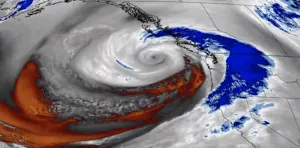
More wildfires, hurricanes likely as climate change leads N.L. to hotter summers
Canada's scorching heat waves this summer were likely the result of climate change, says Environment and Climate Change Canada, while scientists say people should brace for more consequences from swings in the weather, including hurricanes and wildfires.
Atlantic Canada experienced temperatures in June that were 10.6 degrees higher than average, says Environment Canada research scientist Nathan Gillett.
In Newfoundland and Labrador, June's monthly temperature averages were above normal in every region, according to Environment Canada.
Labrador saw the highest above-average temperatures, and experienced a dramatic wildfire season, forcing evacuations in Churchill Falls and later Labrador West.
Gillett says that all heat waves that scientists analyzed this summer were "at least twice as likely because of human-induced climate change."
"The risk of these kinds of heat waves is substantially increased because of climate change. And you know, of course, we expect it to continue to increase as the climate continues to warm," said Gillett.
SEE ALSO: Hurricane Ernesto steadily marching toward Canadian waters
Among the impacts of rising temperatures are longer ice-free seasons, snow on the ground for less time, more heavy rainfall events, a rise in the sea level, and more storm surges.
Hotter temperatures, riskier conditions
Heat waves can have different impacts in different regions.
"Whether you're on the coast, it'll always be cooler, moderated by the ocean. Whereas if you're on land away from the water, then … typically the temperatures can get hotter," said Gillett.

An aerial photo shows the forest fire near Churchill Falls at the peak of its strength. (Government of Newfoundland and Labrador)
However, he says the warming is widespread.
"Heat waves are going to get hotter everywhere," said Gillett, "whether you're the ocean or inland."
Warming temperatures mean an increased risk of wildfires, says Gillett, who added that the size of the area burned to date in Newfoundland and Labrador is well above the long-term average.
"Across Canada, we can expect or we're seeing it already an increased risk of wildfire from warming drying out forests."
In the last two years, Canada has seen a greater number of wildfires than average, says Norm Catto, a retired Memorial University geography professor.
Catto says forest fires are caused by either humans or lightning. In Labrador, lightning events are more likely where conditions tend to be drier, and there has been less logging than on the island.
"An increase in hot, dry weather and thunderstorm activity, which will lead to more lightning, will produce more fires," he said in an interview.
Storm surges and hurricanes are a major concern as well.
DON'T MISS: A trio of robin's eggs provides a symbol of hope after wildfires in N.L.
Catto said that while climate change doesn't necessarily mean there will be a greater number of weather events, it will cause more intense events.
The sea level is currently rising all around the island of Newfoundland, said Catto.

A satellite image of Hurricane Ernesto churning in the Atlantic Ocean on Aug. 16, 2024. (NOAA)
"The fastest rates are those that we see in the southern parts of the island, like St. John's, where we're looking at rates of rise on the order of three and a half millimetres per year."
Catto says that the rising sea levels are related to the province's glacial history and the amount of water in the ocean.
"So if we think about the melting ice bodies in Greenland and Antarctica, that's obviously putting more water into the ocean."
Adaptation needed
While it's up to global actors to work on reducing emissions to prevent further climate change, Catto says adaptation strategies can be considered on a regional level.
"Regardless of what our position is in terms of putting gases into the atmosphere, we still have to deal with the problems," said Catto.
In the case of forest fires, he said, this means using resources to identify fires, put them out, deploy fire\fighters and do evacuations more effectively.
As for storm surges and hurricanes, he said, costal areas must consider building and zoning policies, moving people back from the coastline, search and rescue capacity, and other emergency management operations.
"A lot of people are doing a lot of good work," said Catto, adding Newfoundland and Labrador has been working with municipalities to help develop climate change adaptation plans.
"We're living here, so everything we do has an impact," he said. "We all just have to keep living here and adapting the best we can."
Thumbnail image credit to Robert Dawe via CBC News.
This article, written by Abby Cole, was originally published for CBC News.










